‘There are still accidents ... people are still dying’
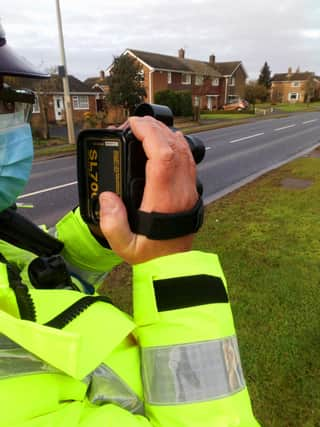

His reply is swift: “There might be less traffic on our roads but there are still accidents...there are still people dying on our roads.
“Quieter roads don’t mean safer roads.”
Latest figures show 535 drivers were seriously injured or killed on the county roads in 2019. Last year, a further 52 people lost their lives.
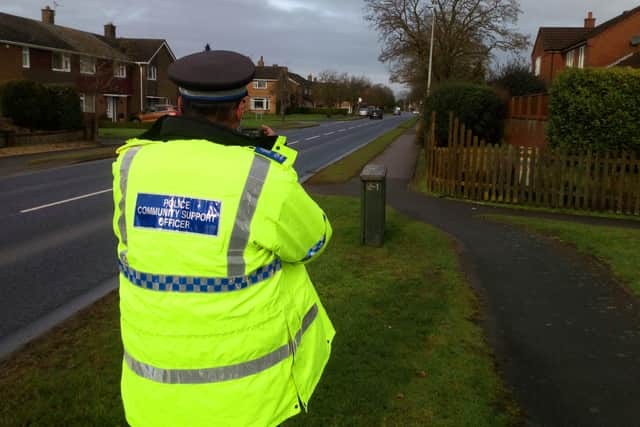

Speed was often a contributory factor.
Advertisement
Hide AdAdvertisement
Hide AdPCSO Mohamed explains some surveys actually suggest our roads have become more dangerous in the lockdown as the absence of other vehicles means we’re all driving faster.
How many of us have seen a long stretch of straight (and traffic free) road and pressed ever so slightly on the accelerator pedal?
PCSO Mohamed is about to expand on that point when his speed gun signals a driver is exceeding the 30mph-limit on Mareham Road in Horncastle.
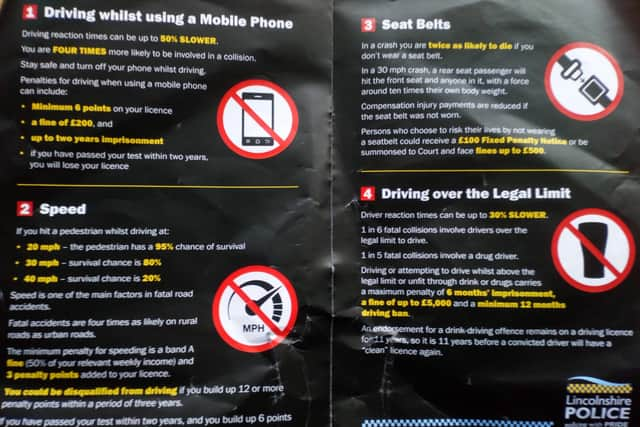

The driver is immediately contrite (he was in a hurry to get home) but in this instance, he escapes with a few well chosen words of advice.
Advertisement
Hide AdAdvertisement
Hide AdPCSO’s have the discretion on whether to file a penalty charge notice (PCN) for a speeding offence.
The actual speed is an obvious factor but there’s other criteria, including road conditions and how a driver reacts to being pulled over.
Even when presented with the evidence via the speed gun’s digital read-out, drivers will claim ‘Honest officer, I was doing less than 30...’
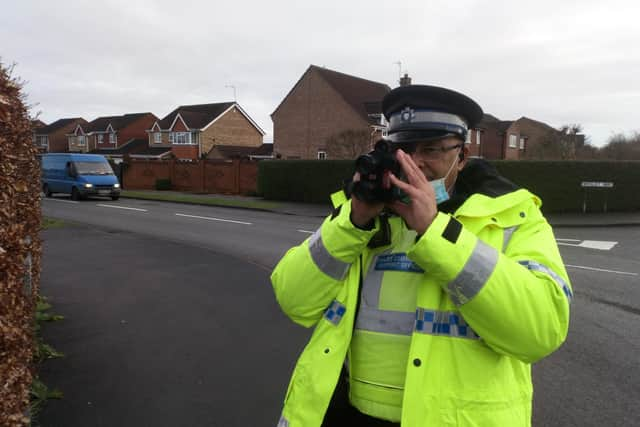

PCSO Mohamed has heard every excuse in the book - and a few more besides!
Advertisement
Hide AdAdvertisement
Hide AdWhat a lot of drivers probably don’t realise is the latest speed guns can register how fast a vehicle is travelling at a distance of 500 metres!
PCSO Mohamed adds: “A lot of drivers will slow down when they see me.
“When you explain the facts, some drivers are OK but some are very argumentative, aggressive...abusive.
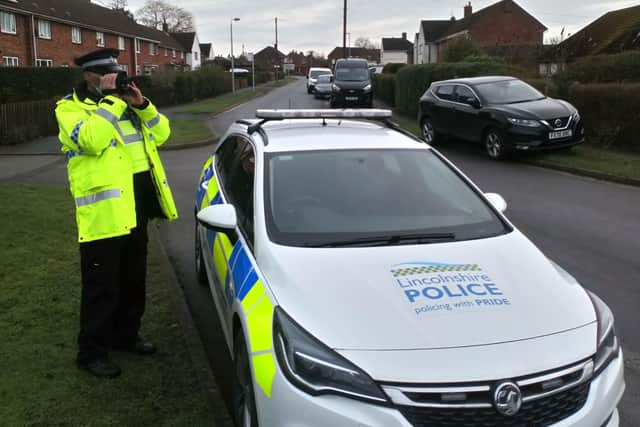

“I’ve suffered abuse. I probably get it every day.
“You learn to live with it.
“It shouldn’t be part of the job but it is.
“We’re not robots. We’re humans. We have feelings.
“All we’re trying to do is make our roads - and our communities - safer for everyone.”
Advertisement
Hide AdAdvertisement
Hide AdThe vast majority of drivers abide by the rules - lockdown or not - but a small minority think they are above the law.
Like all forces, Lincolnshire Police adopted the four ‘E’ policy for dealing with many offences.
Sadly, engage, encourage and explain don’t always work so the fourth and final ‘E’ - enforcement - is employed.
Anyone who follows police activity on social media will know PCSO Mohamed doesn’t let all drivers off with a warning.
Advertisement
Hide AdAdvertisement
Hide AdIf he opts for further action, he files a report which is sent to a central office.
It’s they who decide what action to take, if any. Sometimes, police have no alternative.
PCSO Mohamed regularly clocks ‘speeders’...“The worst,” he admits, “was someone doing 82 in a 30. Crazy.”
Two weeks ago, he gave ‘advice’ to several drivers who exceeded 30 on the A158 in Wragby.
Advertisement
Hide AdAdvertisement
Hide AdOne driver was reported because he’d travelled from Leicestershire for a ‘day out at the coast.’
That wry smile reappears on the PCSO’s face as he explains: “It certainly wasn’t an essential journey.
“I don’t understand why some people seem to think they can drive 100 miles - for a day out.
“Am I shocked? Yes. Am I surprised? No.”
The number of Covid-related fines has increased, nationally and locally.
PCSO Mohamed says: “The NHS is being overwhelmed.
Advertisement
Hide AdAdvertisement
Hide Ad“Even when lockdown ends, it’s going to take a long time (for the NHS) to recover.
“The rules are there to protect everyone and if we (the police) can help to reduce the number of people who have to go into hospital for treatment, that’s a positive.”
Regular public consultations between police and residents indicate many communities want officers to target the ‘fatal four’ driving offences - speeding, mobile phones, drugs/drink driving or failing to wear a seat belt.
To prove that point, a woman pedestrian approaches PCSO Mohamed and tells him: “It’s good to see you here (Mareham Road).
“They come flying down here like idiots.
Advertisement
Hide AdAdvertisement
Hide Ad“There’s kiddies and old people but they (drivers) couldn’t care less.”
The PCSO nods and smiles, thanks the woman and prepares to head off to another location.
This time, we’re on the much busier Boston Road.
Within seconds, the driver of a Transit van has been ‘pulled over.’
PCSO Mohamed uses mobile technology to check all the relevant driving documents are in order.
The Transit driver is fortunate.
Advertisement
Hide AdAdvertisement
Hide AdHe drives off with a few well chosen words of advice ringing in his ears.
PCSO Mohamed adds: “There are various things I say to drivers. One is that if a vehicle hits someone at 30mph, there’s an 80% chance that person will survive - at 40mph there’s an 80% chance they will die.
“Sometimes, a few short, sharp facts like that can make a driver think.”
Other times, it’s a speed awareness course, prosecution, points on your licence...dearer insurance.
Advertisement
Hide AdAdvertisement
Hide AdPCSO Mohamed says: “It’s not just about the driver. If speed or other driving offences result in an accident and an injury - or even worse - it’s the effect that has on families and friends.
“It’s something you - and the victim’s family - will have to live with for the rest of your life.”
After 20 minutes at Boston Road, it’s time to move on again. No-one is blatantly over the limit - or in breach of lockdown regulations.
“It’s how it goes some days,” reflects PCSO Mohamed, unfastening his luminous yellow jacket that should warn drivers of his presence - but perhaps not from 500m!
“Tomorrow, we might report seven or eight drivers.”
He laughs at the suggestion officers have targets.
Advertisement
Hide AdAdvertisement
Hide AdHe adds: “Yes, we’ve all heard the story ‘it’s getting close to the end of the month so we need to prosecute a few more drivers but that’s not the case. “There are no targets.
“We don’t collect fines. We don’t decide where the money is spent. That’s up to the Government.
“Anyway, if drivers didn’t break the speed limit, use a mobile phone or fail to put on a seat belt they wouldn’t be fined.”
Speed checks formed a small part of PCSO Jad Mohamed’s shift.
He started following up reports from the previous 24 hours.
Advertisement
Hide AdAdvertisement
Hide AdHe noted a Section 59 notice had been served on a driver who was causing a nuisance in the town’s Market Place.
“We don’t call them boy racers,” says PCSO Mohamed. “They are just poor drivers.”
If the offence is repeated, the driver’s vehicle could be ‘seized’ and he/she will have to pay a release fee.
If it’s a serious breach, he/she could face a court appearance.
Advertisement
Hide AdAdvertisement
Hide AdThe Section 59 notice was issued following complaints from the public.
His patrol started dealing with someone cheekily parking in the area reserved for police vehicles in Church Lane.
A foot patrol of the town centre reveals no issues although PCSO Mohamed - along with colleagues - is always happy to offer advice and reassurance. to the old and young.
He says: “The other day I met a young lad who had hardly spoken to anyone since last March.
“I spoke to him for half an hour.
“We’re not social workers but we will always try to help. Talking can make a big difference.”